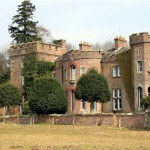David Dalton Kennedy 1808 – 1847 (the elder of Georgiana’s two brothers)
It’s important not to judge people when all the facts aren’t available but Dalton’s behaviour often caused his mother and sisters some concern.
After nearly two years in the notorious Fleet prison for bankruptcy (and yes, it was in all the newspapers, a public humiliation for his mother) Dalton was discharged on 7 June 1836. If the ‘Fleet’ sounds familiar, it may because this prison was named after the river that once flowed beneath Fleet Street, the historical home of London’s newspapers. It’s also the place where ‘Mr Pickwick’ was incarcerated in one of Charles Dickens’ most famous novels.
Before he married, it appears that Dalton was having a relationship with a woman who was deemed highly unsuitable, possibly because she was married or because she was an actress, a career that was frowned on by the gentry because of its associations with lower classes and ‘loose’ women. When John Lowry visited Etterby Lodge to tell Georgiana’s sister Mary that their engagement was off, George Kennedy offered to step up and defend his sister Mary. Dalton, as the eldest brother, could not help at the time because his ‘conduct is now so public that he alas cannot not come forward at present in many things he otherwise might have done’ (Mrs Kennedy to Mary Kennedy July 7th 1835, Cumbria Archive Centre D KEN 3/49/5). Dalton eventually gave the woman up, for which Georgiana mentions her thankfulness in a letter to their mother.
After his marriage to Margueretta Craufurd (second daughter of his guardian, Archibald Craufurd of Ardmillan) on 27th November, 1840 at Ardmillan House near Girvan, Scotland, Dalton and ‘Neta’ lived at Craig, the farming estate his great-grandfather had bought. Inheritance disagreements with his uncles were resolved and Dalton’s own son eventually inherited the estate. Dalton died near Liverpool in December 1847. He was thirty-nine and was buried in St Bridget’s Church, Chester, on 11 December. There are no clues so far as to why he was living, or staying, in the Merseyside/Deeside area.
Dalton and Neta had one child together in 1843, David Archibald Dalton Kennedy (the fourth ‘David Kennedy’ in the family line) and this young man was almost certainly the same ‘Archie’ to whom Georgie Hale (later Georgiana Bisdee)was writing with such affection and calling ‘coz’, her cousin. Archie became a Justice of the Peace for Ayr.
His military career can be followed easily through the promotions lists in the Edinburgh Gazette and the London Gazette.
THE EDINBURGH GAZETTE, AUGUST 9, 1864. Page 1014
David Archibald Dalton Kennedy, gent, to be Ensign, by purchase, vice Stepney. Dated 5th
August 1864.
THE EDINBURGH GAZETTE, OCTOBER 19, 1866. Page 1221
Ensign David Archibald Dalton Kennedy to be Lieutenant, by purchase, vice Carstairs. Dated
16th October 1866.
THE LONDON GAZETTE, APRIL 7, 1871. Page 1805
David Archibald Dalton Kennedy, Gent., late Lieutenant 78th Foot, to be Lieutenant, Dated
6th April, 1871.
In June 1872 the officers of the Royal Sherwood Foresters (Nottinghamshire Militia) included
Lieutenant David Archibald Dalton Kennedy,
THE LONDON GAZETTE, AUGUST 29, .1873.
Nottinghamshire or Royal Sherwood Foresters.
Lieutenant David Archibald Dalton Kennedy to be Captain. Dated 30th August, 1873.
THE LONDON GAZETTE, APRIL 17, 1877. 2619
Nottingham or Royal Sherwood Foresters.
Captain David Archibald Dalton Kennedy resigns his Commission. Dated 18th April, 1877.
Archie died at Brest in Finisterre, France on 22 January 1886 when he was forty-six. His place of death may not be a coincidence. His mother, Dalton Kennedy’s widow, married again in October, 1850. Her second husband was Aimé Reynaud, born 1808 in Lyon, a high profile admiral in the French navy. When Reynaud returned to France after the Crimean war, he became ‘Préfet Maritime de Brest’ and ‘Conseiller Général du Finistère’. Archie’s stepfather died at Brest in July, 1876.


